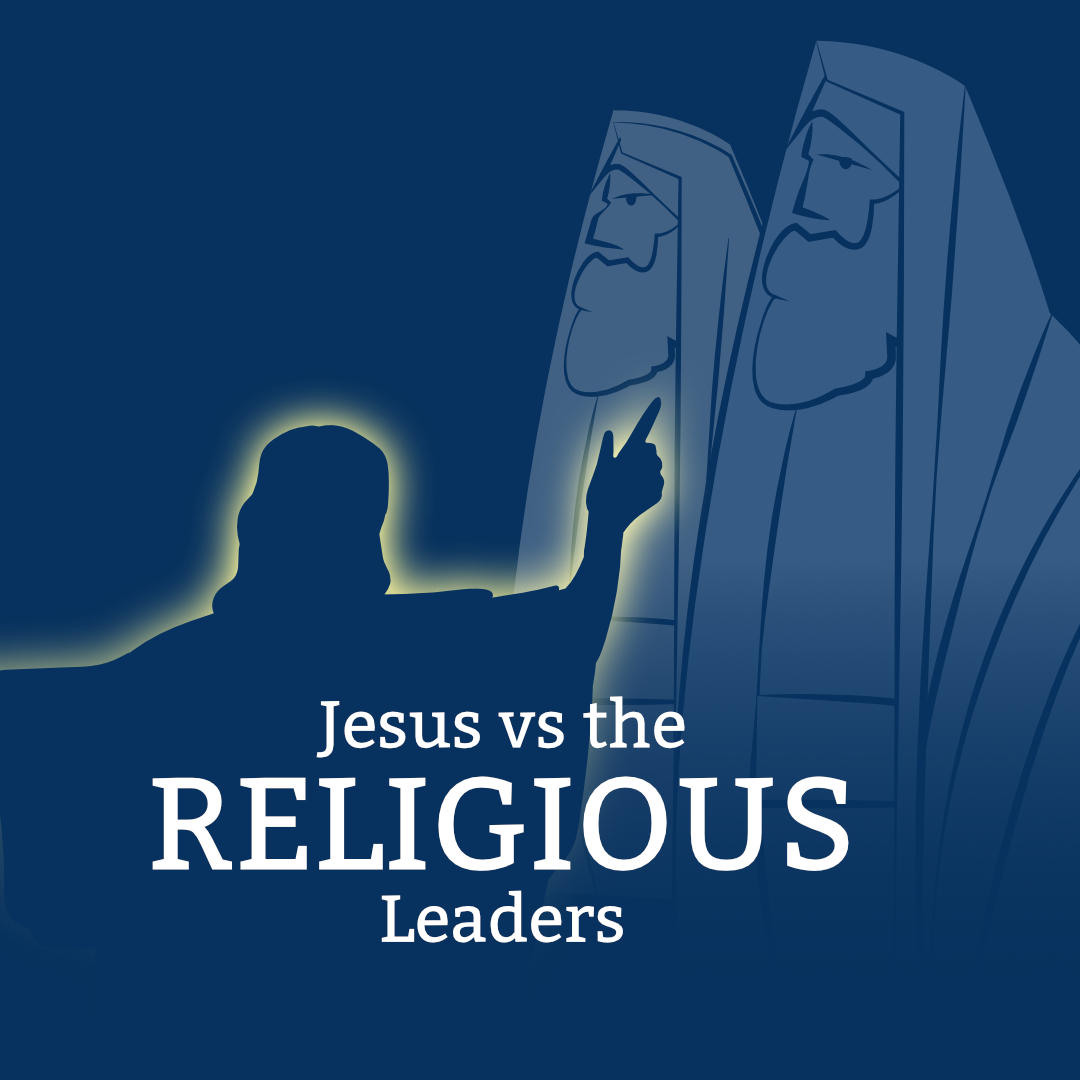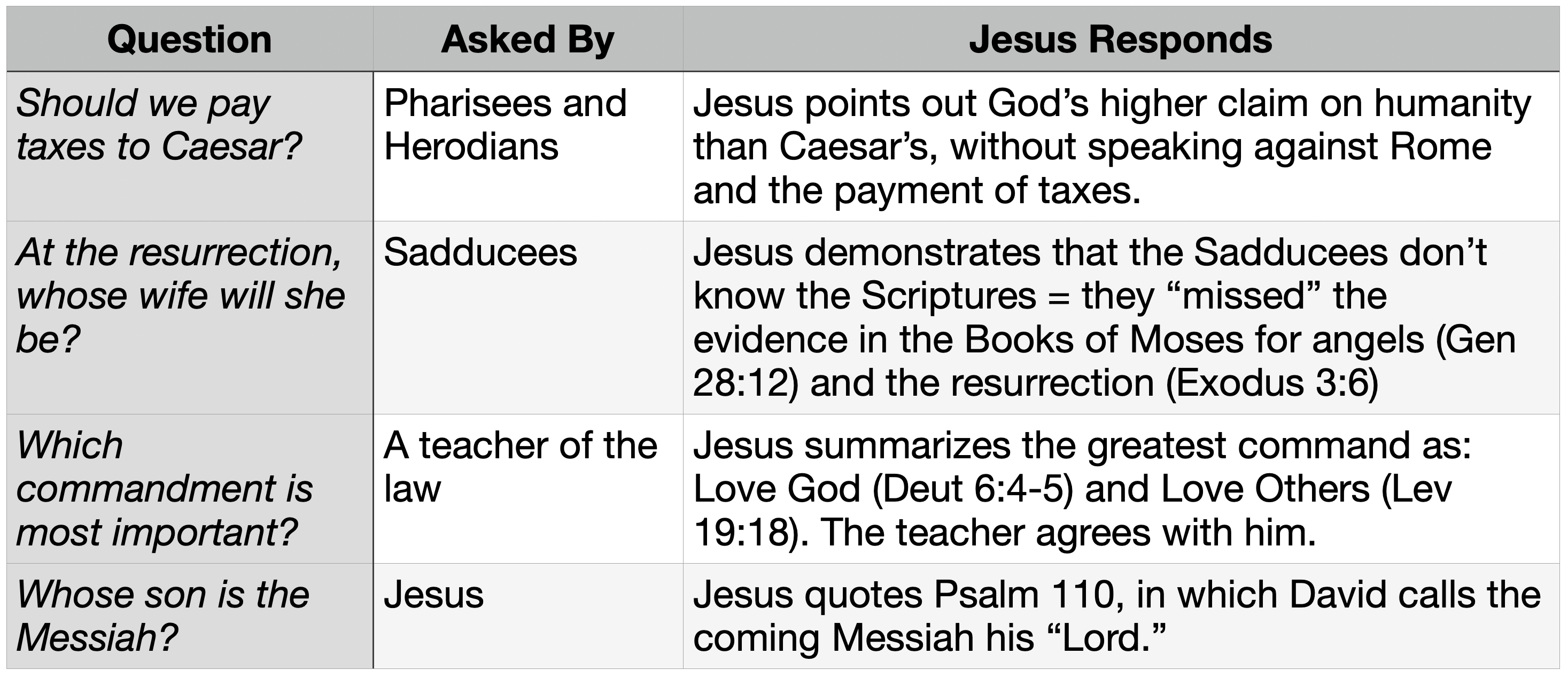Journey to the Cross: An Easter Study From Mark’s GospelНамуна


Jesus Versus the Religious Leaders (Mark 11:27-12:44)
"Then the chief priests, the teachers of the law and the elders looked for a way to arrest him because they knew he had spoken the parable against them." Mark 12:12 (NIV)
Context
Today, we will read about the “final standoff” between Jesus and the religious leaders in Jerusalem before his death on the cross. This section contains a parable. As its own type of literature, we must understand that parables do not simply illustrate spiritual truths. Instead, they targeted specific listeners, with the main purpose of evoking a response to God’s kingdom.
Context from Isaiah 5 will help us to interpret the purpose of the parable of the tenants: to expose the hard hearts of many Jewish religious leaders. They were exactly like their ancestors, who had persecuted the prophets (see 2 Chronicles 36:16) and consistently rebelled against the Lord (see Deuteronomy 9:13). For this, they would also be judged.
After the reading from Mark, you will read Psalm 110, the psalm from which Jesus quotes in Mark 12:36. In the 1st century, most Jews viewed Psalm 110 as a messianic psalm, which would be fulfilled with the eternal reign of a son of David (see 2 Samuel 7). Several authors of the New Testament interpret this psalm as prophetically pointing to Jesus. It is referenced frequently, probably because the eyewitnesses reported Jesus himself interpreting his fulfillment of this psalm.
Observation
Notice the entire crowd would have heard the parable of the tenants. Still, the chief priests, teachers of the law, and the elders are its target (Mark 12:12). Also, note the parable's various elements that will need to be interpreted because they point to something beyond the parable. You can highlight each one in the text:
- The vineyard
- The vineyard owner
- The tenants
- The owner’s servants
- The owner’s son
- The others given the vineyard
After the parable, the religious leaders begin asking Jesus questions in the temple courts. See the chart below for a summary of their dialogue:

Interpretation
Isaiah 5:1-7 enables us to interpret the parable of the tenants in the following way:
- The vineyard = Israel, God’s people who were intended to produce good fruit (Isaiah 5:2, 7)
- The vineyard owner = God (Isaiah 5:7)
- The tenants = also Israel, but specifically those with hard hearts who resisted God’s plan for the vineyard (Isaiah 5:2, 7)
- The owner’s servants = the prophets sent to Israel with God’s word
- The owner’s son = Jesus, who is killed by the vineyard’s tenants
- The others given the vineyard = the ones who accept Jesus as God’s Son and are thus revealed as the true people of God (which will extend to include Gentiles)
With their hard hearts exposed, the religious leaders bombard Jesus with questions intended to catch him in his words. But Jesus demonstrates great wisdom in every reply. And the dialogue concludes with a question Jesus himself poses, for which the religious leaders have no answer: “Whose son is the Messiah?”
In the 1st century, most Jews interpreted Psalm 110 to be about the coming messianic king. This story in Mark’s gospel indicates that Jesus held the same view. By highlighting the fact that David called the future Messiah his “Lord,” Jesus points out that the Messiah must be more than just David’s biological son. In this way, Jesus alludes to his divine identity and gives his listeners time to consider the significance of what he has just revealed.
Application
Jesus is both David’s son (human) and also David’s Lord (God). This means serious consequences exist for those with hard hearts who choose to reject his words and his atoning sacrifice.
As you prepare for Easter, consider the state of your own heart:
- Is it soft before the Lord and open to receiving Jesus’ words of correction?
- Or, is it hard to refuse to surrender certain areas that are offended by Jesus and his ways?
About this Plan

This plan will guide you through an inductive study of Jesus’ journey to the cross, beginning with the triumphal entry into Jerusalem. Grab a notebook to jot down your thoughts as you are led through a process of (1) observing the events of Passion Week, (2) interpreting the original message to the church in Rome, and (3) applying the Easter story’s timeless truths to your life today.
More
Нақшаҳои марбут ба мавзӯъ

A Minute of Hope

God Within You - Awaken to the Power and Presence of the Holy Spirit

Hope for Imperfect Families From the Story of Joseph

The Sabbath Way: Finding the Rest Your Soul Craves by Travis West

The Dove

Love Because: Devotions for In-Law Relationships

Truth to All Generations by Vance K. Jackson

Do Not Be Anxious About Anything

A Practical Guide for Transformative Growth Part 2
